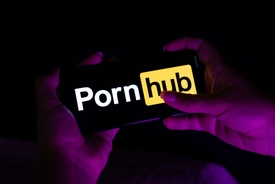Porn is a part of modern life. Virtuous it is not, but this is possibly only because millions of years of biology have taught us that sexual experiences should be shared. Yet even this sense that it is a guilty pleasure to be enjoyed in isolation is something of an outdated idea.
Regardless, it is a part of modern life which is going to get more difficult to access. Soon, adult websites will be blocked from users who cannot - or choose not to - prove that they are 18 years of age or over.
An unprecedented move, the aim of the “porn ban” is to protect vulnerable children from adult content. There will be a number of ways in which an internet user can verify their identity, including age-estimating facial recognition technology, SMS verification, providing credit card details to a third-party gateway or even obtaining a “porn pass” from a local shop.

However, there are plenty of problems with the new measures. Firstly, for anyone who finds buying condoms weirdly embarrassing, the option of picking up a “porn pass” from the same shopkeeper your parents buy bread and milk from probably isn’t too appealing. That leaves the online verification options of which, luckily, there are a few.
In conjunction with a third-party gateway, it is thought that you will be able to use your phone, credit card, driving licence or passport. One such third party gateway is AgeChecked. "The internet has never been more accessible, so protecting our children has become of the highest priority to shield them from viewing inappropriate material online," AgeChecked's CEO Alastair Graham explained to VT.
Graham continues: "The new laws around online age verification, which fall under the Digital Economy Act, were brought in due to concerns over how the adult content sector has been marketing its services, and the lax attitude it has had towards safeguarding minors from being able to view content. The primary area of concern has been young children stumbling across content that has disturbed them."

Unluckily, though, there are vast opportunities here for this information to be misused. When extramarital affair website Ashley Madison was hacked and its users’ information made public, they had to pay out $11 million of compensation to 33 million people.
By comparison, Pornhub - the world’s most-visited porn website - has been known to average close to 100 million daily visits. However, perhaps even more interesting is that one of the systems which may well be taking our personal information is called AgeID, which is owned by MindGeek, who also own RedTube, YouPorn and Pornhub.
Add to this creepy carnival of conspiracy the idea of a porn website asking to guess your age via your webcam and it might be enough to send you to a seedy sex shop for discount DVDs of weird porn you don’t even enjoy. That said, it is only the UK who so far have decided to go ahead with the measures.

But what’s the most likely outcome when trying to watch porn turns into an episode of Black Mirror? “Adults (and some children) may be pushed towards using Tor [a type of virtual private network] and related systems to avoid age verification, where they could be exposed to illegal and extreme material that they otherwise would never have come into contact with,” predicted the government’s own impact assessment.
Furthermore, while there are a number of age-verification gateways with which websites can partner, the actual regulator is the British Board of Film Classification (BBFC). After a lot of deliberating, it was finally decided at the beginning of last year that the regulator for online adult content would be the same organisation responsible for determining whether that James Bond movie is a 12A or a 15.
With ancient roots in assessing lewdness and dangerous political ideas, it seemed that the BBFC might not be the most suited to the job. However, it is just another step towards what many might call British prudishness. In 2014, for instance, the British government banned certain porn from being produced in the UK including “female ejaculation”, “fisting” and “facesitting”. The last of these two, it determined, represented a threat to life.

However, as much as the lack of measure makes for an easy target, that the new law isn’t far-reaching enough makes for another interesting argument. It does not, for instance, cover any form of social media. Platforms such as Twitter, Reddit and, until recently, Tumblr made for a goldmine of pornography for children who would might otherwise not have access to it. However, the porn ban doesn’t impact social media sites or search engines, both of which provide easy access to adult material.
The action comes off the back of a report which found that more than half of children and teenagers who accessed porn “stumbled across” it. Not only is this incredibly ambiguous, the study, commissioned by the NSPCC (National Society for the Prevention of Cruelty to Children), was carried out by OnePoll.
OnePoll is a “creative market research” company - similar to organisations such as YouGov (unrelated to the government). Some of their findings are questionable and, like YouGov, their data more often fuels tabloid headlines rather than policymaking.

However, the NSPCC has also highlighted some pertinent statistics. "A study from the NSPCC supports the idea that children are greatly influenced by the content they see," AgedChecked's Alastair Graham continues. "It found that a third of child sex abuse cases are carried out by other children, and the problem is being driven by access to adult-content by the underaged. This just goes to show how vulnerable and impressionable children really are, and why safeguarding them from harmful material is absolutely vital."
In all likelihood, when the new law comes into effect on 1 April, it will not beckon in some sort of porn apocalypse. "AgeChecked never stores personal information on its users and credentials are anonymised - so personal data cannot be passed on to adult websites, or indeed anyone," explains Graham. "The technology works by age-verifying customers through - for example - a driving licence or credit card and allowing users to access age-restricted sites and products via a unique username and password. Customers only have to go to through age verification once, from then on an AgeChecked login provides the necessary age check for website operators."
"When a customer tries to access an age-restricted website or service, the site will only receive a ‘pass’ or ‘fail’ message from AgeChecked - nothing more," Graham adds, soothing our concerns. "Users that do not meet the age requirements will be denied entry."

However, the most simple workaround for those unwilling to relinquish their personal details would be a VPN (virtual private network). This will tell websites you’re visiting that you’re not from the UK - but from a country of your choosing. Just don’t say I told you.


